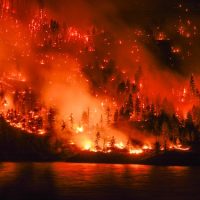
Wildfire—which for most of this century has each year scorched, seared, or incinerated an average of 4.23 million square kilometres of woodland or savannah — is likely to become even more of a hazard, new research concludes.
Wildfires will become more frequent, more intense, and more enduring as global temperatures continue to rise in response to human combustion of fossil fuels, says the report from the United Nations Environment Programme (UNEP).
The toll of unwelcome fire during the years 2002 to 2016 added up to 423 million smoking hectares each year on average. This is an area that matches the land mass of all 27 nations of the European Union, and is twice the size of Saudi Arabia or Greenland.
And although catastrophic fires in Australia, Europe, and the North American west have commanded the global headlines, 67% of area of this annual global toll, from all causes, has been in Africa.
During those years, according to UN analysis, there were around 13 million fires, each lasting on average four to five days and consuming 440 hectares. One fire in Australia burned almost 18,000 hectares. One fire in a vehicle in Arizona in June 2020 sparked a roadside blaze that then torched 26,000 hectares in three days.
The report warns that fire can create the conditions for yet more warming, and yet more fire.
Wildfire generates particles of soot, or black carbon, and other pollutants that can darken glaciers and thus accelerate their rates of melting. It can trigger large-scale blooms of algae in ocean waters. It can turn rainforests from carbon sinks—natural stores of atmospheric carbon—into sources, once again to generate more warming.
And the more extreme blazes can generate plumes of smoke so vast as to generate erratic windspeeds that further fan the flames. The same phenomenon can trigger thunderstorms and flashes of lightning that can start fires in dry forest regions far from the fire front.
Fire is also a health hazard downwind. Smoke from wildfires is estimated to kill thousands every year, sometimes thousands of miles from the source of the blaze, and the first victims are the already ill, women, children, the elderly, and the poorest.
UNEP also points to the threat to wildlife, with an estimated 4,400 land and freshwater species now endangered by wildfire and other human assaults on the natural world. That’s because beyond the smoking tree stumps and scorched shrubs that follow a dangerous blaze, global heating has already begun to alter the world to which, over the last 10,000 years, millions of species had already adapted.
The report addresses types of fire, their causes, and actions that should be taken to limit the risk. It also lists other causes for concern, inseparable from human impact upon the planet.
One of those hazards is a phenomenon blandly known to conservationists as phenological mismatch. Climate change has begun to disturb the natural rhythms that order the life cycles of plants and animals on land, in lakes and rivers, and in the oceans.
In the northern hemisphere, for example, spring happens ever earlier. Those species that leaf, flower and fruit, mate and breed, or nest, pollinate, or migrate, rely on cues such as temperature and rainfall, or day length. But while spring temperatures arrive far earlier, day length doesn’t change.
Moreover, the advance of spring temperatures across the latitudes is uneven. Birds that recognize the signals to start migrating may not find the conditions, or the prey, they have evolved to expect at feeding sites on the way north, or in the Arctic regions when they arrive. Plants may start to flourish long before the accustomed herbivores get the news. All this presents a threat to survival for large numbers of species: how big a threat has still to be established. More research, the UN agency says, is necessary.
It also warns of another self-inflicted threat to humankind. Noise can seriously affect human and animal health (as downtown Ottawa residents have been seeing and hearing constantly for the last three weeks). Unwanted, prolonged, and high-level sounds from cars, trains, and other machinery can disturb sleep, and amplify heart diseases and metabolic disorders such as diabetes. It can also affect mental health and permanently impair hearing.
Noise pollution is estimated to claim 12,000 lives prematurely in the European Union each year. Noise levels in cities such as Algiers, Bangkok, Damascus, Dhaka, Ho Chi Minh City, Ibadan, Islamabad, and New York have now reached a level that is unacceptable. Once again, the very young, the elderly, and the most marginalized communities are most at risk.




